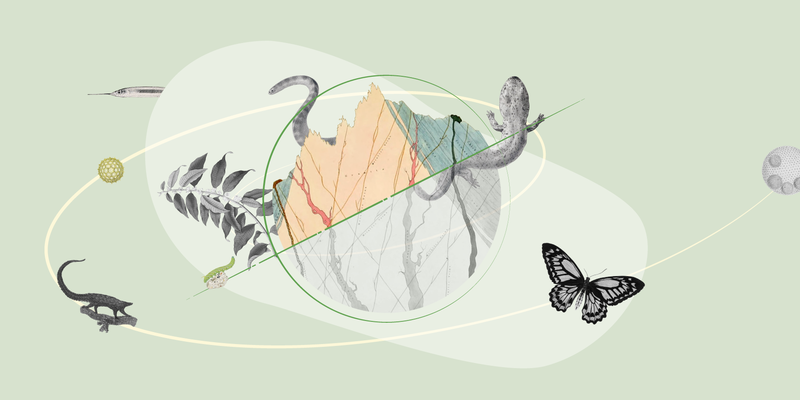News
Report reveals return on investments in GBIF
Published 6/26/2023
Study by Deloitte Access Economics finds that every €1 invested in global network, infrastructure and services accrues €3 in benefits to users and up to €12 to society

Every €1 invested in the Global Biodiversity Information Facility provides €3 in direct benefits to users and up to €12 in societal benefits, according to the the first economic valuation of GBIF's network, infrastructure and services. This finding is one of several insights outlined in the report, Economic valuation and assessment of the impact of the GBIF network, prepared and published by Deloitte Access Economics.
The Deloitte team of economists applied multiple analytical methods to produce this estimate, comparing and combining the results to quantify the total economic impact created by investments in GBIF. While some approaches used narrowly defined calculations to capture direct user benefits from different services, other measures explored the value that wider society accrues from indirect benefits reliant on GBIF's network, infrastructure and services. The report puts the annual value of GBIF to users at €48 million on a total investment of €15 million (roughly €5 million globally and €10 million at national scale), while indirect benefits to society may reach €185 million per year.
Other key findings from the report include:
- GBIF expands the scope of what is possible. Almost half (47 per cent) of all data users surveyed by Deloitte reported that they would have found it impossible to achieve their research in the absence of GBIF.
- "The most substantial and quantifiable benefit of GBIF" is an average estimated time saving of 64 hours per user over finding data through alternative sources.
- Nearly all users (92 per cent) linked their use of GBIF-mediated data to advancing contributions to the UN Sustainable Development Goals.
"This study is critical for helping GBIF's participants and stakeholders outline our value proposition and clearly express the benefits we generate not simply for researchers and policymakers, but for society at large," said Liam Lysaght, director of the National Biodiversity Data Centre of Ireland and chair of the GBIF Governing Board. "Its findings reveal that the GBIF network delivers profound value for money while contributing to the solutions urgently needed to address biodiversity loss, climate change, and other pressing environmental issues."
The final report also outlines a method that GBIF nodes can apply to prepare national-scale estimates of the value of time saved in research costs thanks to data access. While this measure represents just one of many elements contributing to the analysis, the potential for using it at national scale responds directly to feedback from GBIF participants following their review of the report's first draft at the 29th meeting of the GBIF Governing Board (GB29). Secretariat staff expect to work with node managers and staff put the method into practice in Canberra at the Global Nodes Meeting, just ahead of GB30 in October 2023.
The report echoes findings in other recent broad-scale analyses of GBIF. The Twenty-Year Review of GBIF prepared by the Committee on Data of the International Science Council (CODATA) recommended commissioning "a targeted study on the monetary value of sharing biodiversity data and of the added value that data infrastructures provide to it." The following year, a comprehensive review of more than 4,000 peer-reviewed studies that relied on GBIF-mediated data concluded that "globally integrated biodiversity datasets enabled researchers to ask questions at taxonomic, temporal, and spatial scales that would otherwise be impossible."
"Our study confirmed that the value of GBIF's network is far greater than the sum of its parts," said Josh Appleton-Miles of Deloitte Access Economics. "Aggregating and standardizing biodiversity data across national boundaries and making it openly accessible provides a much larger economic dividend."
The report provides another first: a calculation of the monetary value of volunteers' service to the GBIF network. Despite capturing only a limited number of the roles in which individuals act as unpaid trainers, translators and reviewers, the estimates puts the annual value of their efforts at €958,000—around one fifth of the Secretariat's average annual budget. These voluntary contributions of time have proven difficult to capture, as staff from GBIF participant nodes and partner organizations often have not charged or recorded it.
Direct cost savings flow the other way as well. The report reveals examples of direct institutional cost savings attributal to GBIF for its nodes and data publishers. The Natural History Museum, London, estimates that GBIF saves the United Kingdom more than €500,000 by avoiding the cost of employing ten duplicative positions. Meanwhile, access to GBIF’s digital infrastructure lowers both wage and capital costs for the U.S. Geological Survey—home of the GBIF United States node—by nearly €200,000 per year.
"By detailing the many ways that GBIF provides value, this report will encourage wider adoption and further reinforce the benefits we provide to both science and society," said Joe Miller, GBIF executive secretary. "We knew that we amplified the impact of our participants, publishers and partners, but the analysis in Deloitte's study greatly enhances the GBIF business case, not just for member countries, but also for those that have not yet joined as participants."
In light of the current report's limitations and expected changes in GBIF's impact over time, the report concludes with potential data needs and alternative approaches for further studies into its scientific and societal value.
- Expanded metrics on direct impacts that build on this report's survey of national nodes
- Thematic analyses of high-impact research areas for GBIF's flow from data to knowledge, like human health (see recent analysis on GBIF support of research on wild organisms and human diseases)
- Deduplication value that quantifies the reallocation of time from gathering data from other sources to more productive research
- Analysis of the value of data standardization, which "is difficult to quantify, but could be in the order of billions of euros"